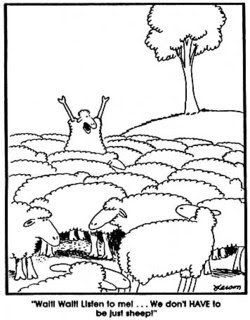"We played the flute for you, and you did not dance;
we sang a dirge, and you did not mourn." (Matt 11:16-17)
I wrote in the Prologue about the questions of beliefs and their perceived consequences.
What does the contemporary Christian believe?
Why does s/he have those beliefs?
Of what consequences are those beliefs?
These are important questions because they can tell us what drives a particular Christian - you, me or whoever. They could explain the kind of salt and light that we are.
This post is about the modern Christian. What is such a creature all about and what tune is s/he playing? More importantly, what would be the result if we were to deconstruct him/her?
The Christian is all about faith [in Christ Lord Jesus]. Without it, you or I would be like a ship in a storm with no anchor - an aimless, directionless destiny at the mercy of all kinds of forces.
Faith, however, is not just a personal matter. Rather, it has a deeply spiritual and physical outflow beyond even the reaches of the believer. Without over-complicating the matter, the key question is - what kind of light and salt are we? If we are the Christian that we ought to be, surely there must be elements of light and salt in our testimony.
When James declared that faith without works is dead, it is a recognition of the outflow of the personal faith beyond the believer. James recognised the importance of a [do-ing] outflow that is observable, godly and socially-conscious. That outflow is what was described by the Christ as being the light and salt. The Christian must be a social agent of godly change! The caveat is that in doing so, s/he must regard such work as glory to God rather than self.
If we are to elevate God in our outflow as light and salt then it is imperative than we ensure that every aspect of our be-ing and do-ing has sound scriptural basis, free from all kinds of doctrinal interpretations and errors that are so pervasive today.
There is still a strong need to be just like the Bereans - verifying all that we read and hear against what is in the scriptures. It is the only scriptural basis to ensure that our beliefs, thoughts, words and actions align with the Holy Spirit's illumination of the Word.
Back to two of the fundamental questions that I rephrased earlier. Our reasons for the beliefs that we hold may appear to be rooted in the experiences that we have had. Similarly, we may have our own perception of the consequences for those beliefs e.g. What would happen if we do not believe them? What must happen if we are to be true to those beliefs?
The truth is that both of these human perceptions are illusory. The true underpinning for both the reasons and the consequences are completely rooted in God's Word.
Back to two of the fundamental questions that I rephrased earlier. Our reasons for the beliefs that we hold may appear to be rooted in the experiences that we have had. Similarly, we may have our own perception of the consequences for those beliefs e.g. What would happen if we do not believe them? What must happen if we are to be true to those beliefs?
The truth is that both of these human perceptions are illusory. The true underpinning for both the reasons and the consequences are completely rooted in God's Word.
For if we must be the light and salt that Christ commanded, we need to ensure that our be-ing and do-ing are exactly as He taught and [He] continues to illuminate through the Holy Spirit. To do otherwise would be similar to displaying an authentic brand but losing the substance upon which the authenticity of that brand is based.
